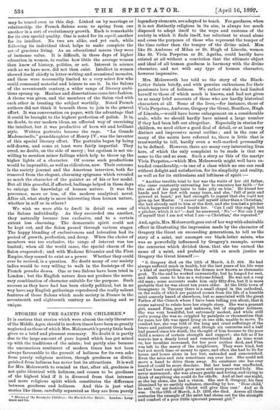STORIES OF THE SAINTS FOR CHILDREN.* IT is curious that
stories which were almost the only literature of the Middle Ages, should in modern times have been so greatly neglected as those of which Mrs. Molesworth's pretty little book gives us a brief and pleasant summary. No doubt it is partly due to the large amount of pure legend which has got mixed up with the traditions of the saints ; but partly also because the unconscious sentiment of modern times has not been always favourable to the pursuit of holiness for its own sake from purely religious motives, though goodness as distin- guished from holiness has never lost its attractions. It is well for Mrs. Molesworth to remind us that, after all, goodness is not quite identical with holiness, and ceases to be goodness of the highest kind if it is divorced from that intenser and more religious spirit which constitutes the difference between goodness and holiness. And this is just what stories like these, carefully separated as they are from purely
• Stories of the Saints for Children : the Black-Letter Saints. London; Long- mann and Co.
legendary elements, are adapted to teach. For goodness, when it is not distinctly religious in its aim, is always too much disposed to adapt itself to the ways and customs of the society in which it finds itself, too reluctant to stand alone and cross the purposes of those who represent the temper of the time rather than the temper of the divine mind. Men like St. Ambrose of Milan or St. Hugh of Lincoln, women like St. Vivia Perpetua or St. Agatha, could hardly have existed at all without a conviction that the ultimate object and ideal of all human goodness is harmony with the divine character, and not with any type of human character, however impressive.
Mrs. Molesworth has told us the story of the Black- Letter Saints briefly, and with genuine enthusiasm for their passionate love of holiness. We rather wish she had limited herself to those of which much is known, and had not given us so many brief accounts of those who are hardly historical characters at all. Some of the lives,—for instance, those of Vivia Perpetua, Ambrose, Gregory the Great, Boniface, Hugh of Lincoln,—would have borne enlargement on a considerable scale, while we should hardly have missed a large number if they had been left out altogether. Especially in stories for children, we need either a good deal of detail, or at least very distinct and impressive moral outline ; and in the case of many of the saints here referred to, there is little that is trustworthy to tell, hardly even a well-marked personality to be defined. However, there are many very interesting lives here, of which the only complaint to be made is that we come to the end so soon. Such a story as this of the martyr Vivia Perpetua,—which Mrs. Molesworth might well have ex- tended considerably,—is one of a class which no one can read without delight and satisfaction, for its simplicity and reality, as well as for its enthusiasm and loftiness of spirit :—
" Another terrible trial to her was the visits of her old father, who came constantly entreating her to renounce her faith= for the sake of his grey hairs to take pity on him.' He kissed her hands and her feet with many tears, and she, full of pain and grieved at heart,' yet had strength to repeat that she could not give up her Master. 'I cannot call myself other than a Christian,' she had already said to him at the first, and she touched a pitcher which happened to stand beside her. Can I call this aught but a pitcher, which it is? '—And he answered, No.'—` Nor can I say of myself that I am not what I am—a Christian,' she repeated."
And, again, Mrs. Molesworth goes out of her way with admirable effect in illustrating the impression made by the character of Gregory the Great on succeeding generations, to tell us the story of a saint, not amongst our black-letter saints, who was so powerfully influenced by Gregory's example, across the centuries which divided them, that she too earned the name of a saint, and probably with as much justice as Gregory the Great himself :— " S. Gregory died on the 12th of March, A.D. 604. He had always suffered much in health, but the last years of his life were a kind of martyrdom,' from the disease now known as rheumatic gout. To the end he worked unweariedly, but he longed for rest, and death came to him as a welcome friend. He was not a very old man; some accounts make him only fifty-five, but it is more probable that he was about ten years older. At the little town of Gemignano in Tuscany there is a small chapel in the cathedral, on the walls of which are painted scenes from the life of a humble saint scarcely heard of elsewhere, but so associated with the great Father of the Church whom I have been telling you about, that it seems natural to relate here her simple story. She was a peasant girl, named MIA, poor and unknown, but of singular holiness. She was very beautiful, but extremely modest, and while still quite young she was so crippled by paralysis or rheumatism that for years her life was spent lying on one aide, unable to move. To comfort her, she was told of the long and cruel sufferings of the brave and patient Gregory ; and, though six centuries and a half had passed since his death, the thought of him became to the poor child a source of certain strength and support; she felt as if he were to her a dearly loved and venerated friend. As time went on, her troubles increased, for her poor mother died, and Flea was left to the mercy of the neighbours. They were kind, but had not much time or money to spare, and often she had to lie for hours and hours alone in her hut, untended and unnourished. Even the mice and rats sometimes ran over her. She could not move a hand to drive them away. No existence one has ever heard of could be more desolate. But her head was unaffected, and her heart and spirit grew more and more pure and holy. She never murmured; she was always gentle and loving, and trying to think of anything she could do for othel's. And at last one night, as she lay alone, she had a vision. She saw S. Gregory, his face illumined by no earthly radiance, standing by her. Dear child,' he said, 'on my festival Christ will give thee rest.' And so it was. On the 12th of March, A.D. 1253, she died. Across all those centuries the example of the saint had shone out for the strength and comfort of a poor little ignorant peasant girl."
But it is not by mere patience and fortitude chiefly that Mrs. Molesworth loves to illustrate the true grandeur of the saints' characters. She dwells just as much on their moral courage and originality, on their tenderness for the short- comings of others, on their self-forgetfulness and laborious self-devotion ; and, on the whole, her book is admirably calcu- lated to remind the present generation that it is impossible to attain a very high type of goodness without giving at least as much time and zeal to that endeavour, as men give without grudging to the attainment of a high professional reputation, or of a high literary or scientific culture.

































 Previous page
Previous page